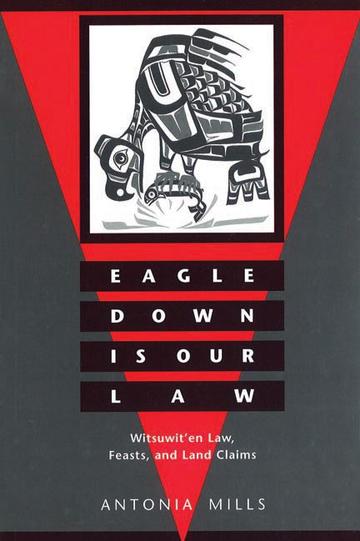About BC Books Online
BC Books Online was created for anyone interested in BC-published books, and with librarians especially in mind. We'd like to make it easy for library staff to learn about books from BC publishers - both new releases and backlist titles - so you can inform your patrons and keep your collections up to date.
Our site features print books and ebooks - both new releases and backlist titles - all of which are available to order through regular trade channels. Browse our subject categories to find books of interest or create and export lists by category to cross-reference with your library's current collection.
A quick tip: When reviewing the "Browse by Category" listings, please note that these are based on standardized BISAC Subject Codes supplied by the books' publishers. You will find additional selections, grouped by theme or region, in our "BC Reading Lists."
Eagle Down Is Our Law is about the struggle of the Witsuwit'en peoples to establish the meaning of aboriginal rights. With the neighbouring Gitksan, the Witsuwit'en launched a major land claims court case asking for the ownership and jurisdiction of 55,000 square kilometers of land in north-central British Columbia that they claim to have held since before the arrival of the Europeans. In conjunction with that court case, the Gitksan and Witsuwit'en asked a number of expert witnesses, among them Antonia Mills, an anthropologist, to prepare reports on their behalf. Her report, which instructs the judge in the case on the laws, feasts, and institutions of the Witsuwit'en, is presented here. Her testimony is based on two years of participant observation with the Witsuwit'en peoples and on her reading of the anthropological, historic, archaeological, and linguistic data about the Witsuwit'en.
Antonia Mills is associate professor in the First Nations Studies program at the University of Northern British Columbia, Prince George.
Eagle Down is Our Law ... marks the start of an era in which First Nations will increasingly produce their own representations of their social institutions and histories. Mill’s book provides an opportunity for non-Natives to begin to develop an understanding of the nature and operation of Witsuwit’en society.
In ongoing discussions of the role of expert witnessing, this book will remain a significant contribution.
UBC Press is to be commended for putting together a fine book. The numerous prologues and forwards help the reader put Ms. Mills' testimony into legal and cultural context. As for Ms. Mills' testimony itself, I am quite confident that it will ultimately emerge as a far more noble and respectable document than Chief Justice McEachern's judgment.



